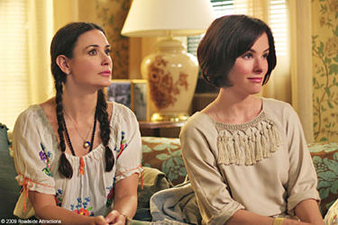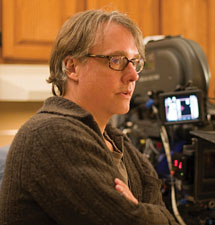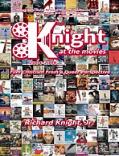
Writer-director Lichtenstein at work on the set, Demi Moore and Parker Posey, his two stars who
play mismatched sisters caring for their ailing father
play mismatched sisters caring for their ailing father
film from a queer perspective
Interview
| KATM media outlets |
| KATM featured weekly |
| Join Us! |
| KATM on RT |
| Vidcast Starring KATM |
| NOTE: THIS SITE ONLY LOADS CORRECTLY WITH EXPLORER AND MOZILLA BROWSERS - SORRY SAFARI USERS! |
| Buy the KATM Book |
Mitchell Lichtenstein Talks Happy Tears
Expanded Edition of 2-10-10 WCT Interview
By Richard Knight, Jr.
Expanded Edition of 2-10-10 WCT Interview
By Richard Knight, Jr.
| Out writer-director-producer Mitchell Lichtenstein created a bit of a sensation with his debut film Teeth, the graphic horror comedy in which the leading lady’s vagina included a pair of murderous incisors. Now he returns with a family drama Happy Tears (opening exclusively on Friday, Feb. 19 at the Gene Siskel Film Center) in which mismatched sisters Parker Posey and Demi Moore argue about what to do with dad played by wild man Rip Torn who is slipping into dementia. Mitchell is the son of the late pop art icon Roy Lichtenstein – a relationship that he draws on for the character of Posey’s husband in the film. The one time performer – noted for his work in Altman’s Streamers (recently released on DVD) and Ang Lee’s The Wedding Banquet – was also one of Hollywood’s first out of the closet actors. Lichtenstein discussed all this and more in a wide ranging interview with Windy City Times. Excerpts: WINDY CITY TIMES (WCT): Where did the idea for Happy Tears come from? MITCHELL LICHTENSTEIN (ML): Kind of two things emerged. One was wanting to do a story about this woman who has trouble facing uncomfortable truths or reality and that combined with some biographical – not so much autobiographical – biographical things in my extended family. They turned out to be things that could be merged together. There are certainly some autobiographical aspects to it but not so much where some people might think in that since my father was a well known artist and there’s a character in the film… WCT: Right. I wondered immediately, knowing of your famous father pop artist Roy Lichtenstein, if Jackson, the character of Parker Posey’s husband in the film was written to express what you had gone through dealing with your father’s legacy and maybe similarities in the troubled relationship they obviously had. ML: Well not like Jackson and his father in the movie. This serves the plot of the movie – they had a bad relationship and the son was trying to prove something after his father’s death and that’s bound to fail since the father’s not around anymore to prove it to (laughs). My father and I had a great relationship and it was nothing like that but I know that world somewhat and I thought this was a subplot that needed to be drawn in broad strokes. WCT: It’s good to hear you clarify that because I was familiar with your father’s work and knew for years, of course, that you were openly gay. I know a lot of gay men our age went through difficulties with our fathers so as I watched this character in the film I thought, “Maybe he’s working out the fact that maybe his dad wasn’t always so comfortable with his being gay.” ML: No, not at all. The only bad thing about having him as a father was that you want something to rebel against growing up and it was hard to rebel against someone who was so cool. WCT: “Dad – you’re too cool!” Do you have sisters? ML: No I don’t. WCT: I’m curious, then. You wrote those two women played by Parker Posey and Demi Moore really well – where does the feminine insight come from? ML: I don’t know. There are sisters in my extended family although the relationship is not so much based on them. I made that dynamic up but it turns out that the dynamic existed but I didn’t know it until after they saw the movie. WCT: How did you decide on those two actresses? You wouldn’t necessarily think of Parker Posey and Demi Moore as sisters – those were interesting choices. ML: I wasn’t really thinking of anyone in particular when I was writing it but when I came around to thinking about casting Parker seemed like the best choice and luckily she really liked the script. Once she committed to it, it was about finding someone who was a good match and contrast to Parker and I’d always loved Demi’s work and thought if she was into doing this kind of movie that it would be great to see her in, say, a less high concept movie, which is what she had tended to do in most of the movies we think of her in. I remembered loving her early movies that showed more range. WCT: Like Mortal Thoughts, perhaps – where you see that she can do a lot more. ML: Demi’s energy is very sensible and grounded and Parker’s of course is very flighty and not to say neurotic (laughs) but whatever you want. WCT: You could say neurotic (laughs). ML: Well certainly the character. I just thought they would be a great match. WCT: How about Ellen Barkin who is absolutely fearless playing the father’s “girlfriend” who’s actually a drug addict. ML: I just got a kick out of thinking of the idea of her in this part and it took a little convincing – I don’t think she was afraid of looking bad – but I got on the phone with her and Parker got on the phone with her convincing her to do it. I think she just wasn’t sure that she wanted to work at all but once she committed I knew that she would have to look pretty bad in the movie. But I never would have asked her to go as far as she voluntarily went. She really leapt in. WCT: When I talked with Lee Daniels, the director of Precious, we discussed the idea of gay men having this great ability to get close to women. He acknowledged that and told me it was very helpful on the set. Did you have any sense of that when you worked with these talented women? ML: I certainly think the relationship is different in the similar way that it’s probably different in life. Usually you’re talking about beautiful women – if they’re actresses – and the way they relate to men is different when the men are not on some level coming on to them (laughs) or there’s not the suspicion that there’s a kind of sexual power trip going on. There’s not the same kind of power trip. That’s a big generalization but as long as we’re generalizing (laughs). It’s a different dynamic and maybe more intensified on a film set. WCT: You worked with directors like Robert Altman and Ang Lee as an actor – did those two powerhouses behind the camera influence your directing style – I mean not just in working with actresses but someone like Rip Torn where you might need (laughs) a wrangler! ML: Well I was heading to the set for my first day with Rip I called a director friend who had worked with him a few years earlier for moral support. I would just say it was, “Don’t take things personally” (laughs). He has great ideas and he’s very passionate about what he’s doing and I would say that he’s usually right about it. But sometimes he thinks maybe he’s anticipating a fight from a director so he’ll get into battle mode prematurely but most of the time I agreed with the change he wanted to make. WCT: You get a sense from watching him over the years that he will do just about anything for a director he respects. The scene in which he poops his diapers and Parker and Demi have to change it – I thought, “I bet he’d really take a dump on camera if Mitchell asked him to.” ML: I was really dreading that scene because I didn’t know how he was going to react but he was in such a great mood doing that scene (laughs). With an actor like that you’re asking him for what he does best and the rest of it just goes with the territory. I would work with him again any day. WCT: That whole idea of taking care of somebody who is slipping into dementia or facing severe health challenges – I’m thinking of the last stages of AIDS – where you have to buck up and feed the person and wipe their ass and all that kind of stuff. It so reminded me of the first wave of the AIDS pandemic. Am I correct in picking up on some of that being an undertow in the script? ML: Probably subliminally. I wasn’t aware of it until you brought it up but, yeah, I was not the main caretaker but my best friend had AIDS and passed away years ago. He had a nurse who did the hard stuff but I was a caretaker there and my mother had dementia many years ago and I was certainly aware of those challenges. WCT: I find it interesting that a lot of gay men our age have experienced a lot of these things and are sort of emotionally prepared to jump in and deal with these difficult areas. ML: Yes, yes. My partner is taking care of his mother who is beginning to get dementia. He does all the hard stuff but we’re both familiar with the difficulties of this. WCT: Obviously now with “Don’t Ask, Don’t Tell,” you must be thinking a little bit about the period when you worked in the movie of Streamers with Altman – back in the early 80s. As a real rarity in those days – an openly gay actor – it must have been interesting to play an obviously gay soldier in the piece. ML: Yes it was. I can see more in retrospect. Then, I was just thrilled at the part. What I think about most often now about being out is that when the movie premiered at the Venice Film Festival and we got word that the actors were going to win the acting prize it turned out that I was the only one who was able to go to Venice to accept the award. My publicist at the time said, “They may ask about your sexuality and what are you going to say?” and I said, “Well, I’ll just say that I’m gay and whatever.” “No, no, you can’t do that you’d be the first openly gay actor, bla bla bla” and it turned out that no one was really so direct. But the final twist was that the publicist – who was married for years – later came out himself. So, it’s not just the straight people keeping us in line. It’s all internalized. WCT: It’s still going on. Many gay directors have gone on the record saying, “If you’re a young leading man type you might want to stay in the closet because that’s the reality.” How do you feel about that? ML: I think that everyone should come out and I also think that actors won’t work as much if they do. So I think both. I think it’s the reality because it’s what I did. WCT: Did that have anything to do with your leaving acting Mitchell? ML: Only in the sense that I don’t necessarily blame it on that but it was always a struggle to work. You know, every ten years I’d get a great part but I had other interests luckily and when I started writing and directing that was fulfilling enough and I lost any desire to act. WCT: I hope it means a lot to you that you made your mark as a gay actor in both Streamers and The Wedding Banquet and are now doing that as a writer-director. ML: Thank you. WCT: From the horror comedy Teeth to this family drama – what’s next a Bollywood musical (laughs)? ML: That would be fun (laughs). I’m adapting a novel that came out a few years ago by Arthur Phillips called “Angelica.” It’s a Victorian psycho-sexual ghost story. There are some similarities to Teeth, actually. I hope that’s what I get to do next. WCT: Well it must be wonderful to see something you wrote come to fruition and to be the one to take it from the page to the screen. ML: Being on set seeing it all come to live is a little surreal sometimes but sometimes it seems to write it as a short story and have people read and imagine it for themselves (laughs) instead of going to all this trouble. But I’m happy with the movie and I’m glad that all the actors are happy with it. WCT: Crying Happy Tears over it, no doubt (laughs). ML: Yes, yes. |





